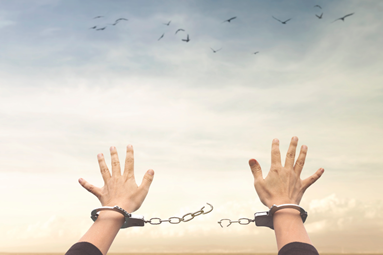by Victoria Sexton Esq. – Anti-Human Trafficking Attorney at Coast to Coast Legal Aid of South Florida, Inc.
 For some, the idea of human trafficking occurring in our neighborhoods and communities seems not only unlikely, but fictional. However, Broward County Florida ranks second highest in Florida for reported human trafficking. It is not only happening; it is happening a lot. We have it all, international ports, nightlife, sporting events, and a huge service industry. Human trafficking is a crime of opportunity. Traffickers do not discriminate when preying on victims. What does this mean? Our neighbors, children, service workers, friends, and family are all potential victims of human trafficking. Traffickers look for individuals who have some form of vulnerability. This can be anything from gaps in their support systems, financial issues, language barriers, individuals suffering from addiction, homelessness, or disabilities. Human trafficking is happening in Broward County and it is growing.
For some, the idea of human trafficking occurring in our neighborhoods and communities seems not only unlikely, but fictional. However, Broward County Florida ranks second highest in Florida for reported human trafficking. It is not only happening; it is happening a lot. We have it all, international ports, nightlife, sporting events, and a huge service industry. Human trafficking is a crime of opportunity. Traffickers do not discriminate when preying on victims. What does this mean? Our neighbors, children, service workers, friends, and family are all potential victims of human trafficking. Traffickers look for individuals who have some form of vulnerability. This can be anything from gaps in their support systems, financial issues, language barriers, individuals suffering from addiction, homelessness, or disabilities. Human trafficking is happening in Broward County and it is growing.
We can play a part in prevention, awareness and restoration for victims. For those who have been victimized, post victimization needs are vast. Survivors often need assistance with housing, food stability, medical care, therapeutic services, and legal services. Legally, survivors may need assistance with an Injunction for Protection against their trafficker, family law help, assistance applying for public benefits, a name change for protection, or assistance applying for an expungement for crimes he/she/they were forced to commit while trafficked. In the hierarchy of needs, often times legal assistance is one of the last steps for survivors engaged in post victimization recovery. It is, however, a critical one. For example, criminal records follow survivors for the rest of their lives if not expunged. They affect survivors’ ability to apply for housing, obtain a higher education, their ability to obtain licensure, and often limit career opportunities. Even arrests without prosecution create massive hurdles for survivors.
Florida legislators recognized this barrier and created a statute that provides relief for survivors. In 2013, the Florida Legislature passed §943.0583 the Human Trafficking Victim Expunction Statute. Under this statute, survivors of human trafficking who committed crimes at the direction of, or by force of, their trafficker are able to petition the court to expunge the record. This law provides survivors with a second chance at a new beginning. For many, this clean slate means the difference between housing and homelessness or a viable career versus unemployment. While some states permit human trafficking expungements for “typical” or “common” trafficking charges such as prostitution or providing a false identity to law enforcement, Florida’s law acknowledged that often times victims are forced to commit various crimes that expand beyond the scope of the “typical” trafficking charges. In response to this, Florida created an expungement statute that provides expansive relief permitting survivors to expunge most criminal records, with the exception of extreme/violent criminal offenses. The statute also provides for survivors to petition to expunge multiple arrests, charges, and convictions. This allows for multiple petitions to be pending simultaneously in multiple jurisdictions. As traffickers routinely transport their victims, these provisions accommodate survivors who often have criminal records and numerous charges in multiple counties.
How does expungement work? A survivor, usually through counsel, petitions the Court to expunge his/her/their record. Then, a prosecutor will review the petition and object or agree to the petition. If agreed to, a judge reviews the petition and supporting documents and signs the order to expunge. The order is then sent to the Clerk of Court’s office where the clerks are directed destroy any and all records related to the case and inform the arresting law enforcement agency to do the same.
Because this is a distinct and fairly specific type of expungement, not all judicial personnel or prosecutors are familiar with the unique process. To remedy this in Broward County, on November 1, 2021, Chief Judge Tuter signed Administrative Order 2021-63-CRIM, which states that all human trafficking expungement cases are to be heard by Judge Stacy Ross. Circuit Court Judge Ross is informed about human trafficking and is the founding and presiding Judge of RISE Court, a specialized division within the juvenile dependency and delinquency system that is designed to assist verified or suspected youth victims of human trafficking. The Broward State Attorney’s Office also assigned a specialized human trafficking prosecutor to these expungement cases. This allows for a streamlined process and ensures a prosecutor, who is well versed with human trafficking and trauma-informed, handles these delicate cases.
If you or someone you know is a survivor of human trafficking we are here for you. Coast to Coast Legal Aid of South Florida provides free legal services to survivors of human trafficking. We represent survivors for their expungement cases. If you have a criminal record in Broward County related to your victimization, we may be able to help. Please contact us at: humantrafficking@legalaid.org.
January is Human Trafficking Awareness Month.
#HumanTrafficking #HumanTraffickingPrevention #HumanTraffickingAwarenessMonth #HumanTraffickingPreventionMonth #HT #HTAM #EndTrafficking #TacklingTrafficking #WearBlue #WearBlueDay
Click the following links to read this article in Español, Kreyòl, or Português.
